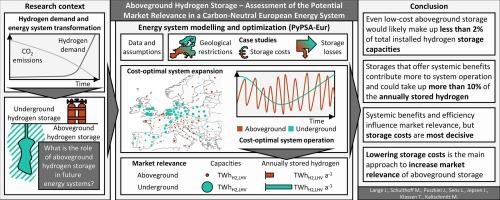当前位置:
X-MOL 学术
›
Energy Convers. Manag.
›
论文详情
Our official English website, www.x-mol.net, welcomes your feedback! (Note: you will need to create a separate account there.)
Aboveground hydrogen storage – Assessment of the potential market relevance in a Carbon-Neutral European energy system
Energy Conversion and Management ( IF 10.4 ) Pub Date : 2024-03-23 , DOI: 10.1016/j.enconman.2024.118292 Jelto Lange , Michael Schulthoff , Julián Puszkiel , Lucas Sens , Julian Jepsen , Thomas Klassen , Martin Kaltschmitt
Energy Conversion and Management ( IF 10.4 ) Pub Date : 2024-03-23 , DOI: 10.1016/j.enconman.2024.118292 Jelto Lange , Michael Schulthoff , Julián Puszkiel , Lucas Sens , Julian Jepsen , Thomas Klassen , Martin Kaltschmitt

|
Hydrogen storage is expected to play a crucial role in the comprehensive defossilization of energy systems. In this context, the focus is typically on underground hydrogen storage (e.g., in salt caverns). However, aboveground storage, which is independent of geological conditions and might offer other technical advantages, could provide systemic benefits and, thereby, gain shares in the hydrogen storage market. Against this background, this paper examines the market relevance of aboveground compared to underground hydrogen storage. Using the open-source energy system model and optimization framework of Europe, PyPSA-Eur, the influence of geological independence, storage cost relations, and technical storage characteristics (i.e., efficiencies) on mentioned market relevance of aboveground hydrogen storage are investigated. Further, the expectable market relevance based on current cost projections for the future is assessed. The studies show that in terms of hydrogen capacities, aboveground hydrogen storage plays a considerably smaller role compared to underground hydrogen storage. Even when assuming comparatively low aboveground storage cost, it will not exceed 1.7% (1.9TWh) of total hydrogen storage capacities in a cost-optimal European energy system. Regarding the amounts of annually stored hydrogen, aboveground storage could play a larger role, reaching a maximum share of 32.5% (168TWha) of total stored hydrogen throughout Europe. However, these shares are only achievable for low cost storage in particularly suited energy system supply configurations. For higher aboveground storage costs or lower efficiencies, shares drop below 10% sharply. The analysis identifies some especially influential factors for achieving higher market relevance. Besides storage costs, the demand-orientation of a particular aboveground storage system (e.g., hydrogen storage at demand pressure levels) plays an essential role in market relevance. Further, overall efficiency can be a beneficial factor. Still, current projections of future techno-economic characteristics show that aboveground hydrogen storage is too expensive or too inefficient compared to underground storage. Therefore, to achieve notable market relevance, rather drastic cost reductions beyond current expectations would be needed for all assessed aboveground hydrogen storage technologies.
中文翻译:

地上储氢——评估碳中和欧洲能源系统的潜在市场相关性
储氢有望在能源系统全面去化石化中发挥至关重要的作用。在这种情况下,重点通常是地下储氢(例如盐洞)。然而,不受地质条件影响并可能提供其他技术优势的地上存储可以提供系统性效益,从而赢得储氢市场的份额。在此背景下,本文研究了地上储氢与地下储氢的市场相关性。使用欧洲开源能源系统模型和优化框架PyPSA-Eur,研究了地质独立性、存储成本关系和技术存储特性(即效率)对上述地面储氢市场相关性的影响。此外,还根据当前的未来成本预测评估了预期的市场相关性。研究表明,就氢气容量而言,与地下储氢相比,地上储氢的作用要小得多。即使假设地面存储成本相对较低,在成本最优的欧洲能源系统中,其储氢能力也不会超过总储氢容量的1.7%(1.9TWh)。就每年储存的氢气量而言,地上储存可以发挥更大的作用,占整个欧洲储存氢气总量的最大份额为 32.5% (168THa)。然而,这些份额只有在特别适合的能源系统供应配置中才能实现低成本存储。由于地上存储成本较高或效率较低,份额会急剧跌至 10% 以下。该分析确定了一些对实现更高市场相关性特别有影响的因素。除了存储成本之外,特定地上存储系统的需求导向(例如,在需求压力水平下的氢存储)在市场相关性中起着至关重要的作用。此外,整体效率可能是一个有利因素。尽管如此,目前对未来技术经济特征的预测表明,与地下储存相比,地上储氢成本太高或效率太低。因此,为了实现显着的市场相关性,所有评估的地上储氢技术都需要比当前预期大幅降低成本。
更新日期:2024-03-23
中文翻译:

地上储氢——评估碳中和欧洲能源系统的潜在市场相关性
储氢有望在能源系统全面去化石化中发挥至关重要的作用。在这种情况下,重点通常是地下储氢(例如盐洞)。然而,不受地质条件影响并可能提供其他技术优势的地上存储可以提供系统性效益,从而赢得储氢市场的份额。在此背景下,本文研究了地上储氢与地下储氢的市场相关性。使用欧洲开源能源系统模型和优化框架PyPSA-Eur,研究了地质独立性、存储成本关系和技术存储特性(即效率)对上述地面储氢市场相关性的影响。此外,还根据当前的未来成本预测评估了预期的市场相关性。研究表明,就氢气容量而言,与地下储氢相比,地上储氢的作用要小得多。即使假设地面存储成本相对较低,在成本最优的欧洲能源系统中,其储氢能力也不会超过总储氢容量的1.7%(1.9TWh)。就每年储存的氢气量而言,地上储存可以发挥更大的作用,占整个欧洲储存氢气总量的最大份额为 32.5% (168THa)。然而,这些份额只有在特别适合的能源系统供应配置中才能实现低成本存储。由于地上存储成本较高或效率较低,份额会急剧跌至 10% 以下。该分析确定了一些对实现更高市场相关性特别有影响的因素。除了存储成本之外,特定地上存储系统的需求导向(例如,在需求压力水平下的氢存储)在市场相关性中起着至关重要的作用。此外,整体效率可能是一个有利因素。尽管如此,目前对未来技术经济特征的预测表明,与地下储存相比,地上储氢成本太高或效率太低。因此,为了实现显着的市场相关性,所有评估的地上储氢技术都需要比当前预期大幅降低成本。



























 京公网安备 11010802027423号
京公网安备 11010802027423号